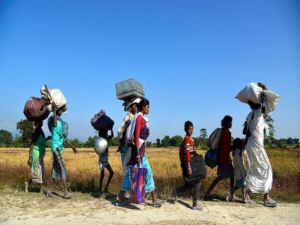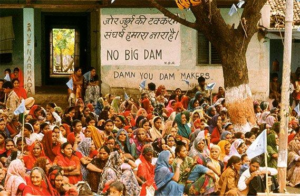
Forcibly displaced without Consent and Rehabilitation

Introduction:
India as a country has been termed as an economically growing nation where many socio-economic development programmes have taken place over the six decades. After independence there has been boom in the industrial economy.
The leaders of the nation strive to make the nation efficient in competing with other developed nations but sometimes such dreams and goals come with the cost of something and that cost has to be imbursed usually by the people living in the backward areas who are provided with minimum to no education.
The basic and the most important human right that is ‘Right to Life’ stands violated and the government often turns an eye away from such situations. The indigenous people often are not aware of their human rights are not conferred with such hostilities without being helped.
A permanent home is what every individual seeks but if we are forcefully asked to move without further incentives then there is a gross violation of human rights. Displacing people in the name of economic development has become a common phenomena moreover not providing with rehabilitation is a much more common phenomena.
What is meant by Displacement?
Displacement means to either forcefully or willingly removing people from their established or temporary habitations to another place. Usually the former is used more often to avoid general violence but sometimes general violence is also used to uproot people from their habitations.
Tribal people are forced to abandon their traditional homes and land, which is their main source of income, due to the compulsory acquisition of property for dam and road building, quarrying and mining operations, the site of industries, and forest reservations for national parks and environmental reasons.

States which are usually rich in minerals, fertile lands and soil are often the land which attracts such displacement procedures. Though development is very important for india’s road to succeed on a global level but it should not be done at the cost of its own citizens well-being and welfare considering we call ourselves to be a welfare state. States like Jharkhand, West Bengal etc are prone to such practices.
Jharkhand, a region containing abundant minerals and natural resources and home to the indigenous Adivasi people, An economically self-sustaining agrarian community is being transformed into a landless casual labour class, forced to live in urban shanties, and reduced to the point of destitution while national and multinational companies are being red-carpeted to come and invest.
So far, local companies have been exploiting the resources and displacing people without rehabilitation. Those from among them who oppose this exploitative process and organise resistance activities are imprisoned and called “naxals” or “maoists.”
The main query is why the Adivasis do not wish to donate their land for the purported “development projects”. The immediate response can be found in the history of the sufferings and pains of the displaced people, which indicates that after independence, 17,10,787 people were relocated while 24,15,698 acres of their land were acquired for the construction of power plants, irrigation projects, mining businesses, steel industries, and other development projects in Jharkhand.
Depending on the project, between 80 and 90 percent of individuals impacted are Adivasis and locals. Sadly, only 25% of them have received partial rehabilitation, and no one knows what happened to the remaining 75% of displaced people. Landlords, Project Officers, Engineers,

Contractors, Bureaucrats, Politicians, and foreigners profit from these development projects while those who gave their all for the “development” are fighting for survival. The indigenous people risk losing their basic identity, which is intricately related to their land, if this process of indiscriminate displacement goes unchecked.
Tribal life is centred on the land. The repercussions of displacement are felt throughout generations in a variety of ways, including the loss of customary occupation (livelihood), environment change, strained ties to the community, marginalisation, and severe psychological distress. It undermines the cultural identity of tribal and ethnic minority and eliminates the current patterns of production, which has an impact on kinship and poverty.

Additionally, forced relocation is frequently linked to greater sociocultural and psychological strains as well as higher rates of sickness and mortality. Therefore, population displacement disturbs the socio-cultural and economic systems.
Development and relocation are directly related to the population of STs. The government needs to prioritise these persons when creating plans and policies for their resettlement. The institution’s dilemma, however, is that the government is not doing much to implement the resettlement plans and laws of the land eviction protesters. The state’s inability to adequately compensate landowners and guarantee the resettlement and rehabilitation of evicted people is a major cause of the resistance.
The Central Government’s use of violence against the forced acquisition of land is an apolitical expression of the lack of a redressal mechanism in every State, estranged communication, and extremist political views.
References:
- http://www.haldiagovtcollege.org.in/wp-content/uploads/2020/05/VI-SEM_C14T_Tribal-Displacement.pdf
- https://loksabhadocs.nic.in/Refinput/New_Reference_Notes/English/DisplacementandRehabilitation.pdf
- http://sanhati.com/excerpted/17315/







